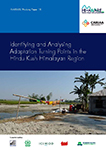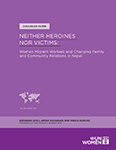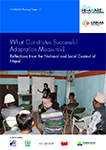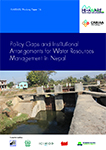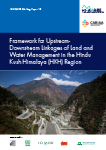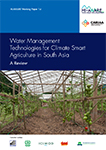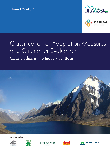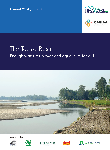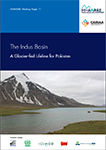Identifying and Analysing Adaptation Turning Points in the Hindu Kush Himalayan Region
Working Paper - 18, 2018
This framework document aims to introduce a proactive approach to assess adaptation needs and encourage timely adaptation. The idea behind this approach is that if an assessment shows that specific policies and practices of stakeholders are at risk of failure due to climate change, corrections are encouraged and losses or damages can be prevented. The approach focuses on identifying whether and when the performance of policies, management, and social-cultural practices drops below a decisive level due to climate change, and adaptation is required.
Neither heroines nor victims: Women migrant workers and changing family and community relations in Nepal (Discussion Paper)
Working Paper, 2018
In Nepal, over the last decade, the share of women migrant workers has significantly increased. Due to prevailing patriarchal norms and values and skewed policy, female labour migration is traditionally stigmatized and associated with sex work or equated to trafficking.
What Constitutes Successful Adaptation Measures? Reflections from the National and Local Context of Nepal
Working Paper - 17, 2018
Adaptation needs and options contain a wide variety of interventions, reflecting their multi-faceted nature. The study identified elements of successful adaptation measures and criteria for evaluating them for which the method of Multi- Criteria Analysis (MCA) was used. Participatory methods such as focus group discussions and interviews with key informants were included. District level workshops were organized to collate data and information.
Policy Gaps and Institutional Arrangements for Water Resources Management in Nepal
Working Paper - 16, 2018
Enhancing the capacity to adapt to climate change impacts has become a critical challenge for the developing countries. This article therefore analyzes the legal and policy aspects and institutional structure of water resource management in Nepal. Policy and institutional analysis approach is used in the research as it offers a more comprehensive framework for thinking water governance issues.
Framework for Upstream- Downstream Linkages of Land and Water Management in the Hindu Kush Himalaya (HKH) Region
Working Paper - 15, 2018
This paper develops a conceptual and generic framework design for the study of upstream-downstream linkages (UDL) in the Hindu Kush Himalaya (HKH) region. The framework application will to define changing upstreamdownstream linkages (UDL) and likely impacts on downstream regions. The results of such applications will be useful for policy makers, planners, decision makers, and researchers. It also addresses actors involved in Integrated Land and Water Resources Management (ILWRM) challenged by changing UDL processes, triggered by broader environmental changes such as climate change and human activities. This framework document defines the upstream downstream relationship. It describes the issues related to UDL mainly around land use and land cover (LULC) changes, erosion and sedimentation, climate change and infrastructure, which affect the availability of water in downstream areas.
Water Management Technologies for Climate Smart Agriculture in South Asia: A Review
Working Paper - 14, 2018
The purpose of the paper was to review selected agricultural water management technologies positioned as climate smart agriculture (CSA), in South Asia. Using the Delphi process, we shortlisted three technologies for the review: zero tillage (ZT), solar-powered irrigation pumps (SPIPs), and micro-irrigation (MI). The technologies were then evaluated on their climate smart aspects. Our analysis found that introduction of climate smart technologies leads to a rise in productivity, water, and energy savings at field level. If we extend the analysis from the field to the basin level, we observe that widespread adoption of such technologies may increase water and energy consumption, thereby offsetting the initial efficiency gains of climate smart technologies. We also found a lack of rigorous impact assessment of these technologies, indicating scope for more internally valid evaluation methodologies.
Classification of Adaptation Measures in the Indus River Basin
Working Paper - 13, 2018
This working paper highlights the cases of climate change adaptation taking place in the Hunza, Soan basin, and Chaj Doab region of the Indus basin in Pakistan.
The Teesta Basin-Enough water for power and agriculture for all?
Working Paper - 12, 2018
This situational analysis report summarizes the socio-economic condition of people and ecosystems of the Teesta basin
The Indus Basin: A glacier-fed lifeline for Pakistan
Working Paper - 11, 2017
The Indus River is the 8th longest river in the world. It originates in the Tibetan Plateau and flows across the entire length of Pakistan.
Critical Climate-Stress Moments and their Assessment in the Hindu Kush Himalaya
Working Paper - 10, 2017
This document discusses and provides a rationale behind the concept of ‘critical climate-stress moments’ in the context of weather variability and climate change (hereafter: critical moments).

